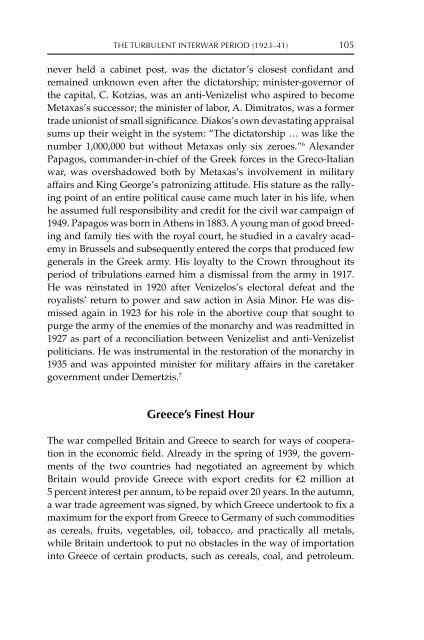MODERN GREECE: A History since 1821 - Amazon Web Services
MODERN GREECE: A History since 1821 - Amazon Web Services
MODERN GREECE: A History since 1821 - Amazon Web Services
You also want an ePaper? Increase the reach of your titles
YUMPU automatically turns print PDFs into web optimized ePapers that Google loves.
THE TURBULENT INTERWAR PERIOD (1923–41) 105<br />
never held a cabinet post, was the dictator’s closest confidant and<br />
remained unknown even after the dictatorship; minister-governor of<br />
the capital, C. Kotzias, was an anti-Venizelist who aspired to become<br />
Metaxas’s successor; the minister of labor, A. Dimitratos, was a former<br />
trade unionist of small significance. Diakos’s own devastating appraisal<br />
sums up their weight in the system: “The dictatorship … was like the<br />
number 1,000,000 but without Metaxas only six zeroes.” 6 Alexander<br />
Papagos, commander-in-chief of the Greek forces in the Greco-Italian<br />
war, was overshadowed both by Metaxas’s involvement in military<br />
affairs and King George’s patronizing attitude. His stature as the rallying<br />
point of an entire political cause came much later in his life, when<br />
he assumed full responsibility and credit for the civil war campaign of<br />
1949. Papagos was born in Athens in 1883. A young man of good breeding<br />
and family ties with the royal court, he studied in a cavalry academy<br />
in Brussels and subsequently entered the corps that produced few<br />
generals in the Greek army. His loyalty to the Crown throughout its<br />
period of tribulations earned him a dismissal from the army in 1917.<br />
He was reinstated in 1920 after Venizelos’s electoral defeat and the<br />
royalists’ return to power and saw action in Asia Minor. He was dismissed<br />
again in 1923 for his role in the abortive coup that sought to<br />
purge the army of the enemies of the monarchy and was readmitted in<br />
1927 as part of a reconciliation between Venizelist and anti-Venizelist<br />
politicians. He was instrumental in the restoration of the monarchy in<br />
1935 and was appointed minister for military affairs in the caretaker<br />
government under Demertzis. 7<br />
Greece’s Finest Hour<br />
The war compelled Britain and Greece to search for ways of cooperation<br />
in the economic field. Already in the spring of 1939, the governments<br />
of the two countries had negotiated an agreement by which<br />
Britain would provide Greece with export credits for €2 million at<br />
5 percent interest per annum, to be repaid over 20 years. In the autumn,<br />
a war trade agreement was signed, by which Greece undertook to fix a<br />
maximum for the export from Greece to Germany of such commodities<br />
as cereals, fruits, vegetables, oil, tobacco, and practically all metals,<br />
while Britain undertook to put no obstacles in the way of importation<br />
into Greece of certain products, such as cereals, coal, and petroleum.


